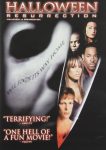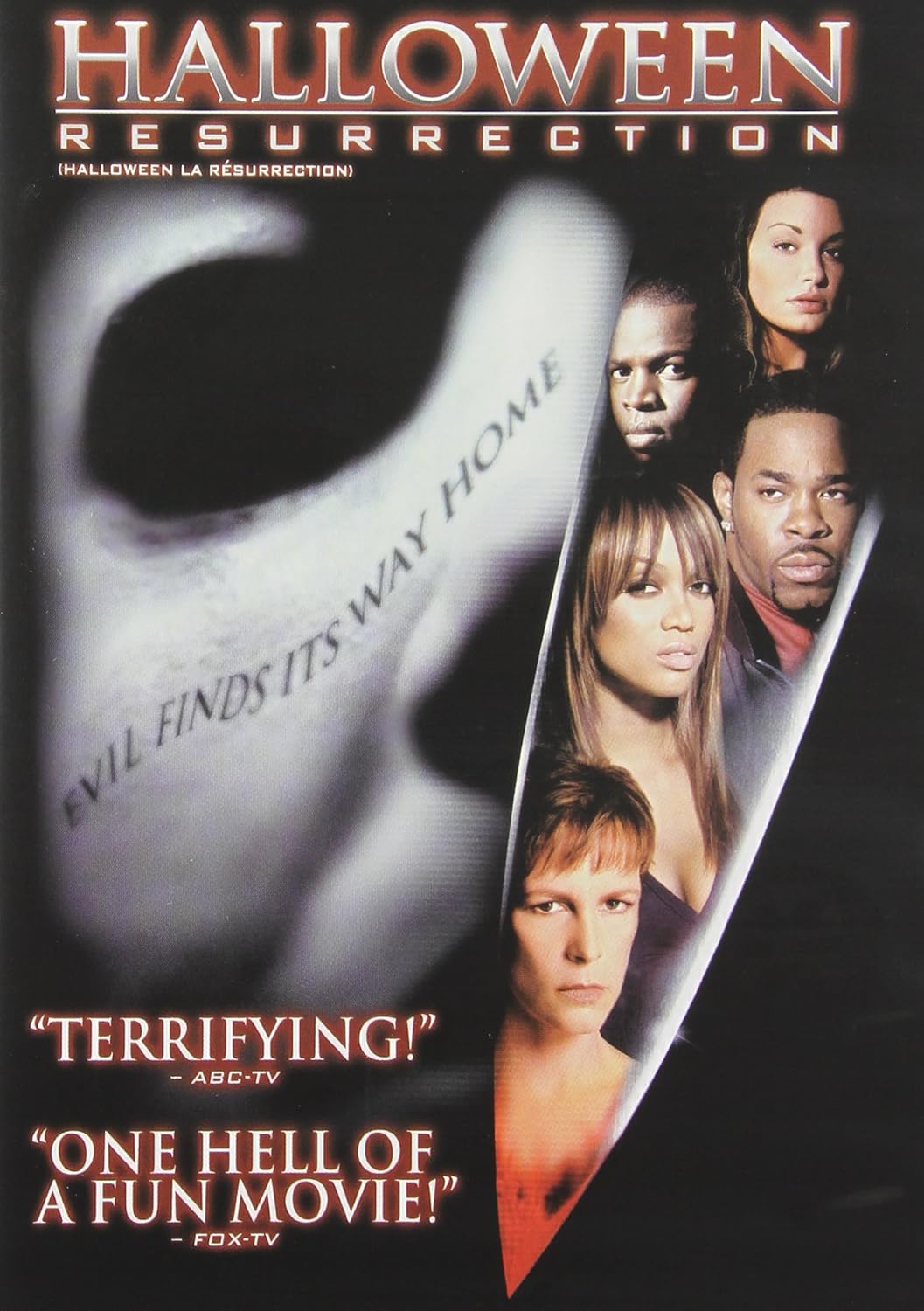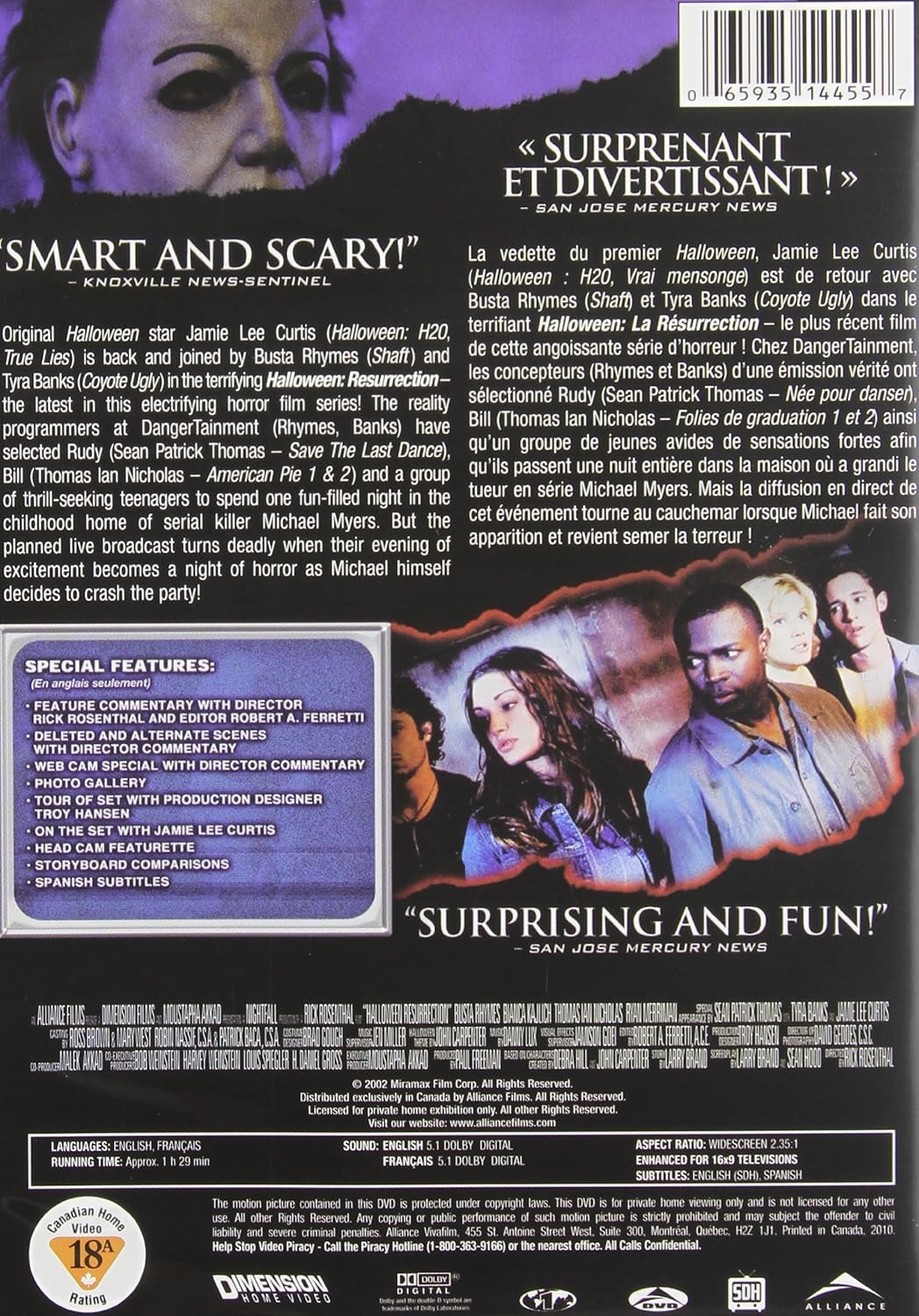
Halloween: Resurrection Review Halloween Resurrection – Oemiu
Halloween: Resurrection Review
Few horror franchises have shown the tenacity of Halloween. Rising, falling, and resurrecting itself time and again, the saga of Michael Myers has captivated audiences for decades. One of its most discussed, and often debated, entries is 2002’s Halloween: Resurrection. This film attempted to inject new blood into the franchise by combining the classic slasher elements with the burgeoning reality television trend of the era. While some appreciated the film’s bold, if flawed, direction, many others viewed it as a misstep, and a significant departure from what made the original Halloween so iconic. Is the vitriol justified? Or is there a kernel of misunderstood genius hidden within this much-maligned sequel? Let’s delve into the film’s plot, characters, reception, and lasting impact to determine the true legacy of Halloween: Resurrection.
The Plot: Reality Bites Back
Halloween: Resurrection picks up directly after the controversial ending of Halloween H20. Laurie Strode, after seemingly decapitating Michael, is revealed to have actually killed a paramedic whom Michael had swapped places with. This revelation serves as a plot device to bring Michael back to Haddonfield. One year later, a group of college students are selected to spend Halloween night in Michael Myers’ childhood home, broadcast live over the internet as part of a reality show called “Dangertainment.” Led by Freddie Harris (played by Busta Rhymes), the group believes they are in for a night of spooky fun, unaware that Michael has returned home. The movie cleverly, or perhaps not so cleverly, blends the slasher genre with the then-popular found-footage aesthetic, aiming to create a more immersive, terrifying experience for the audience, and of course, the viewers watching the “Dangertainment” show. The students’ every move is captured by hidden cameras, providing Michael with ample opportunity to stalk and terrorize them. As the night progresses, the game turns deadly as Michael begins picking off the students one by one, forcing Sara Moyer (Bianca Kajlich) and other survivors to fight for their lives, aided remotely by her friend Deckard (Sean Patrick Thomas) who is monitoring the broadcast. A key element of this narrative is its attempt to explain Michael’s survival and motivation, although these attempts are often considered weak or even laughable by critics and fans alike. The finale involves a confrontation between Michael and Freddie, showcasing Freddie’s martial arts skills – a scene that has become infamous for its absurdity and is a consistent point of criticism in nearly every Halloween: Resurrection review.
Characters: From Iconic to…Questionable
The characters in Halloween: Resurrection are one of the film’s most criticized aspects. While Laurie Strode (Jamie Lee Curtis) makes a brief appearance, her character is unceremoniously killed off in the opening sequence, a decision that angered many fans. Laurie, a symbol of resilience and survival, was reduced to a plot device, effectively ending her storyline in a manner that many found disrespectful to the character’s legacy. The college students, intended to be relatable and engaging, often fall flat, coming across as stereotypical horror movie fodder. Their motivations are thin, their dialogue is clichéd, and their character development is minimal. Freddie Harris, played by Busta Rhymes, is perhaps the most memorable, albeit for the wrong reasons. His character, a martial arts expert and the creator of “Dangertainment,” is cartoonish and out of place in the Halloween universe. The attempts to inject humor through Freddie’s character often fail, instead contributing to the film’s overall tone of absurdity. Sara Moyer, the film’s protagonist, is arguably the most sympathetic character, but even she struggles to rise above the weak script and questionable direction. Deckard, Sara’s friend and tech support, provides a remote connection to the outside world, but his role is largely limited to monitoring the broadcast and offering advice. Michael Myers himself, while still menacing, is portrayed less as a relentless, unstoppable force and more as a generic slasher villain. His motivations are unclear, and his actions are often inconsistent, further diminishing his iconic status. Comparing the characters in Halloween: Resurrection to those in the original Halloween films highlights the stark difference in quality and depth. The original characters were relatable and well-developed, while those in Halloween: Resurrection are often superficial and forgettable. This discrepancy is a major factor in the film’s negative reception. No matter what anyone says about this iteration, and despite the negative criticism, this movie has created a cult-like following, where many have tried to determine the best way to watch Halloween: Resurrection.
Reception and Criticism: A Critical Bloodbath
Halloween: Resurrection was met with overwhelmingly negative reviews from critics and fans alike. It currently holds a dismal rating on Rotten Tomatoes and Metacritic, with critics lambasting its poor writing, weak characters, and nonsensical plot. The decision to kill off Laurie Strode early in the film was particularly controversial, with many feeling that it disrespected the character and the franchise as a whole. The film’s attempts to blend the slasher genre with reality television were also widely criticized, with many finding the concept to be contrived and poorly executed. The comedic elements, particularly those involving Busta Rhymes’ character, were seen as out of place and detrimental to the film’s overall tone. Many reviewers also criticized the film’s lack of scares, suspense, and originality, noting that it relied heavily on clichés and predictable jump scares. The character of Michael Myers was also criticized, with many feeling that he was portrayed as less menacing and more generic than in previous films. One of the biggest criticisms of Halloween: Resurrection is its departure from the established lore of the Halloween franchise. The film’s attempts to explain Michael’s survival and motivation were seen as convoluted and unnecessary, undermining the character’s mystique and ambiguity. While some defenders of the film argue that it is a self-aware parody of the slasher genre, this interpretation is not widely accepted. The negative reception of Halloween: Resurrection had a significant impact on the franchise, leading to a reboot in 2007 with Rob Zombie’s Halloween. The reboot attempted to distance itself from the convoluted storylines of the later sequels, returning to the roots of the original film. Some horror fans love the film for its sheer absurdity and enjoy considering the impact of Halloween: Resurrection on the Halloween franchise.
Legacy and Impact: A Stain on the Mask?
The legacy of Halloween: Resurrection is largely negative. It is often considered one of the worst films in the Halloween franchise, and is frequently cited as an example of how a beloved horror series can go wrong. The film’s poor reception led to a significant decline in the franchise’s popularity, and it took several years for the series to recover. Despite its negative reception, Halloween: Resurrection has gained a small cult following among fans who appreciate its campy humor and over-the-top action. These fans often view the film as a guilty pleasure, enjoying it for its absurdity rather than its quality. The film’s influence can be seen in subsequent horror films that have attempted to blend the slasher genre with reality television or found-footage elements, although none have achieved the same level of notoriety as Halloween: Resurrection. It serves as a cautionary tale for filmmakers, highlighting the importance of respecting the established lore and characters of a franchise. Furthermore, it illustrates the dangers of straying too far from the core elements that made the original films so successful. The film’s impact can also be observed in how future Halloween movies were approached. Subsequent entries in the franchise have largely ignored the events of Halloween: Resurrection, effectively erasing it from the timeline. This decision reflects the widespread dissatisfaction with the film and its perceived damage to the Halloween brand. The film is often used as a point of comparison when discussing the quality of other horror sequels, serving as a benchmark for what not to do. In terms of home media sales, Halloween: Resurrection DVD sales were decent at the time of release, largely due to the established fanbase of the franchise, but sales plummeted quickly after word of mouth spread regarding its quality. While not a positive legacy, Halloween: Resurrection has undoubtedly left a mark on the Halloween franchise, albeit a largely unwelcome one. Its enduring infamy serves as a reminder of the importance of respecting the source material and delivering a product that resonates with fans.
| Feature | Halloween: Resurrection | Original Halloween (1978) |
|---|---|---|
| Plot | Reality TV show in Michael Myers’ house | Michael Myers stalks and kills teenagers |
| Characters | College students, Busta Rhymes | Laurie Strode, Dr. Loomis |
| Tone | Campy, comedic | Suspenseful, terrifying |
| Reception | Overwhelmingly negative | Critically acclaimed |
| Michael Myers Portrayal | Generic Slasher Villain | Silent, relentless killing machine |
Alternative Perspectives: Is There Any Redemption?
While the majority opinion on Halloween: Resurrection is overwhelmingly negative, a small minority of viewers have found some redeeming qualities in the film. Some argue that the movie’s campy humor and over-the-top action are intentionally self-aware, making it a parody of the slasher genre rather than a serious horror film. According to this perspective, the film’s absurdity is part of its charm, and it should be viewed as a lighthearted and entertaining romp rather than a traditional Halloween movie. Others appreciate the film’s attempts to experiment with the slasher genre, blending it with reality television and found-footage elements. They argue that the film’s unconventional approach, while flawed, was at least innovative and daring. Some viewers also find the film’s college student characters to be relatable, appreciating their struggles and their attempts to survive Michael Myers’ rampage. These viewers may also appreciate the film’s exploration of themes such as fear, isolation, and the dangers of technology. While these alternative perspectives are not widely shared, they do offer a different way of looking at Halloween: Resurrection. It is important to remember that art is subjective, and what one person finds to be terrible, another may find to be enjoyable. While the film’s flaws are undeniable, it is possible to appreciate its unique qualities and to find some entertainment value in its campy humor and over-the-top action. The discussions around the Halloween: Resurrection cast have even become something of a niche interest, with some finding nostalgic appeal in the actors involved. Ultimately, whether or not you enjoy Halloween: Resurrection depends on your personal taste and your willingness to embrace its flaws. While it may not be a masterpiece, it is certainly a memorable and controversial entry in the Halloween franchise.
FAQ
Why is Halloween: Resurrection so hated?
Halloween: Resurrection is widely disliked for several reasons, primarily stemming from its perceived disrespect to the franchise’s legacy. The early and unceremonious killing off of Laurie Strode, a beloved and iconic character, deeply upset many fans. The plot, which incorporates a reality television show set in Michael Myers’ childhood home, is seen as contrived and a departure from the core horror elements of the series. The characters are often criticized as being one-dimensional and stereotypical, lacking the depth and relatability of those in earlier films. The film’s attempts at humor, particularly through the character of Freddie Harris played by Busta Rhymes, are generally considered out of place and detract from the overall tone. The nonsensical plot holes and inconsistencies also contribute to the negative reception. Finally, the movie is regarded as lacking genuine scares and suspense, instead relying on cheap jump scares and predictable tropes, leading to its reputation as one of the worst entries in the Halloween franchise.
How does Halloween: Resurrection fit into the Halloween timeline?
Halloween: Resurrection directly follows the events of Halloween H20: 20 Years Later. It attempts to explain how Michael Myers survived his apparent death at the end of the previous film, revealing that the person Laurie Strode decapitated was actually a paramedic whom Michael had swapped places with. However, due to the film’s poor reception, subsequent Halloween movies have largely ignored the events of Halloween: Resurrection. The 2018 Halloween film, for example, acts as a direct sequel to the original 1978 movie, effectively retconning all subsequent sequels, including Halloween H20 and Halloween: Resurrection. This retcon demonstrates the franchise’s attempt to distance itself from the storylines that many fans considered to be convoluted or damaging to the series’ overall quality. Therefore, while Halloween: Resurrection technically exists within one version of the Halloween timeline, it has been effectively erased from the most recent and widely accepted continuity.
Was Jamie Lee Curtis happy with her role in Halloween: Resurrection?
Jamie Lee Curtis has publicly expressed her dissatisfaction with her role in Halloween: Resurrection. She agreed to appear in the film only under the condition that her character, Laurie Strode, would be killed off. Curtis felt that Laurie’s story had run its course, and she was not interested in continuing to play the character in subsequent sequels. However, she was reportedly unhappy with the manner in which Laurie was killed off, feeling that it was disrespectful to the character and her legacy. Curtis has stated that she believed Laurie deserved a more dignified and meaningful exit from the franchise. Her negative experience with Halloween: Resurrection contributed to her reluctance to return to the Halloween franchise for many years. However, she eventually reprised her role as Laurie Strode in the 2018 Halloween film, which offered a more satisfying conclusion to her character’s arc.
Is Busta Rhymes’ character in Halloween: Resurrection supposed to be funny?
Yes, Busta Rhymes’ character, Freddie Harris, in Halloween: Resurrection is intended to provide comedic relief. The character is portrayed as a martial arts expert and the creator of “Dangertainment,” the reality show featured in the film. His dialogue and actions are often over-the-top and absurd, clearly designed to elicit laughter from the audience. However, the comedic elements of his character are one of the most criticized aspects of the film. Many viewers find Freddie Harris to be out of place in the Halloween universe, and his humor is seen as jarring and detrimental to the film’s overall tone. Instead of providing genuine comedic relief, his character is often considered to be unintentionally funny, contributing to the film’s reputation as a campy and absurd entry in the Halloween franchise. The execution of the comedic elements is what ultimately caused the movie to have so many detractors.
What is “Dangertainment” in Halloween: Resurrection?
“Dangertainment” is the name of the fictional reality show featured in Halloween: Resurrection. The show’s premise involves selecting a group of college students to spend Halloween night in the abandoned childhood home of Michael Myers. The house is rigged with hidden cameras, and the students’ every move is broadcast live over the internet. The show’s creator, Freddie Harris (Busta Rhymes), believes that the students will experience a night of spooky fun, unaware that Michael Myers has actually returned to the house. As the night progresses, the show takes a deadly turn as Michael begins to stalk and kill the students, turning the reality show into a real-life horror show. “Dangertainment” serves as the central plot device of the film, providing the framework for the slasher action and the blending of the horror genre with reality television elements.
Are there any deleted scenes or alternate endings for Halloween: Resurrection?
Yes, there are several deleted scenes and an alternate ending for Halloween: Resurrection. One notable deleted scene involves a more detailed explanation of how Michael Myers survived the events of Halloween H20, showing him being treated by a witch doctor who performed a ritual to heal his wounds. Another deleted scene features a longer and more suspenseful sequence in which Laurie Strode confronts Michael Myers in the mental institution. The alternate ending shows Sara Moyer (Bianca Kajlich) being attacked by Michael Myers after she escapes from the house. In this ending, she is saved by her friend Deckard (Sean Patrick Thomas), who arrives in time to kill Michael. The decision to remove these scenes and use the theatrical ending was likely based on test audience feedback and the desire to create a more ambiguous conclusion. However, many fans believe that the deleted scenes and alternate ending would have improved the film’s overall quality.
Does Halloween: Resurrection have any redeeming qualities?
Despite its overwhelmingly negative reception, some viewers argue that Halloween: Resurrection has a few redeeming qualities. Some appreciate the film’s attempts to blend the slasher genre with reality television, even if the execution is flawed. Others enjoy the film’s campy humor and over-the-top action, viewing it as a self-aware parody of the slasher genre rather than a serious horror film. Some also find the film’s college student characters to be relatable, appreciating their struggles and their attempts to survive Michael Myers’ rampage. The movie does offer a unique and unusual plot concept, trying something new with the Halloween franchise, which is something. Ultimately, whether or not you find any redeeming qualities in Halloween: Resurrection depends on your personal taste and your willingness to embrace its flaws. While it may not be a masterpiece, it is certainly a memorable and controversial entry in the Halloween franchise, and has created some of the most iconic (and often memed) moments in the series’ history.


Price: $59.98 - $11.37
(as of Sep 07, 2025 07:59:10 UTC – Details)



![Scary Stories To Tell In The Dark [DVD]](https://oemiu.com/wp-content/uploads/2025/09/1757427628_Scary-Stories-To-Tell-In-The-Dark-DVD-Review-Best-336x220.jpg)
